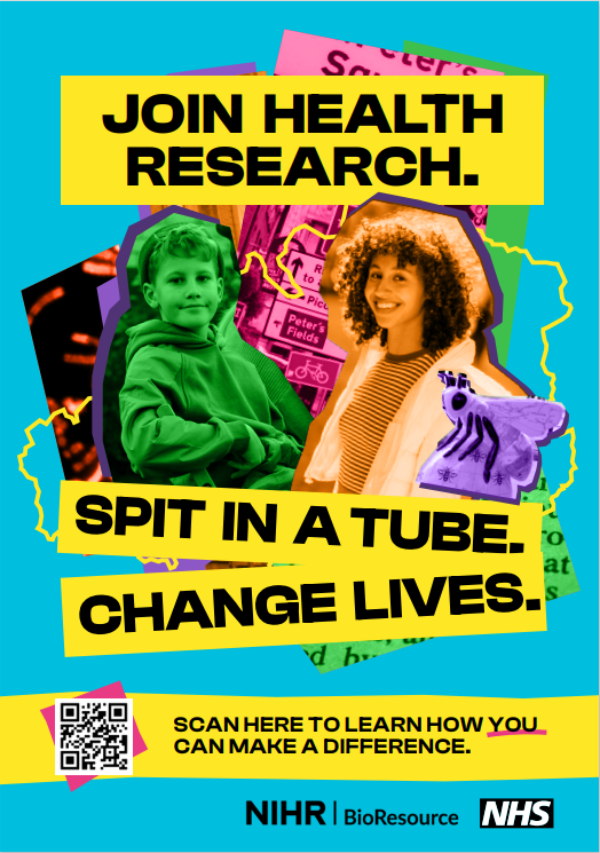NIHR BioResource Centre Manchester
The National Institute for Health and Care Research (NIHR) BioResource Centre Manchester is hosted by the NIHR Manchester Clinical Research Facility (CRF) and supported by the NIHR Manchester Biomedical Research Centre (BRC).
The NIHR BioResource helps researchers carry out health research by connecting them with volunteers who have already given their consent to be contacted for future research. These volunteers may be from the general population or living with specific health conditions, including both common and rare diseases.
By joining the BioResource, participants provide a small sample (like blood or saliva) and health information, which researchers can use to better understand how and why diseases develop. Researchers can also invite volunteers to take part in specific studies based on their health, lifestyle, or genetic makeup—helping make research faster, more targeted, and more relevant.
This approach is speeding up the discovery of new treatments and improving how clinical trials are designed and delivered, making healthcare better for everyone. We work closely with healthcare professionals, patients, members of the public, community groups, and schools.
Why join?
By joining the BioResource, you’re helping to shape the future of healthcare. Your contribution supports vital research that can lead to faster diagnosis, better treatments, and improved care for others—and potentially even for you or your family.
We’re especially keen to hear from:
- Young people and families
- People from Black and other under-represented ethnic backgrounds
- Individuals living with specific health conditions
Explore our current programmes below to see if you’re eligible to join.

Programmes open for recruitment
Who can join? Children and young people aged 0–15 (with parental/guardian consent).
D-CYPHR is helping researchers understand how health develops in childhood and adolescence. Taking part is easy—just a saliva sample and a short questionnaire done. Together, we can improve care for children today and the adults they’ll become.
Who can join? Anyone from a Black ethnic background, including individuals living with Sickle Cell Disorder.
This programme is working to address long-standing health inequalities by ensuring Black communities are better represented in research. Your participation can help us uncover how certain conditions develop, improve treatments and how care is delivered.
Who can join? We are actively recruiting Black participants as part of our commitment to inclusive and representative health research to this study.
Manchester is the national lead centre supporting research into conditions like lupus, rheumatoid arthritis, and psoriasis.
Condition-specific BioResource
Since 2007, the BioResource has built several large groups of patients with certain common and rare diseases to provide researchers with valuable condition-specific health data and information. We are continuing to invite new volunteers to some of our programmes, including the Inflammatory Bowel Disease (IBD) BioResource and Immune Mediated Inflammatory Diseases (IMID) BioResource.
If you have one of these conditions and want to enquire about taking part, please contact us on nbr@bioresource.nihr.ac.uk
For researchers and industry partners
As a researcher, the NIHR BioResource offers access to a deeply characterised panel of participants, including both healthy volunteers and individuals with specific common or rare diseases. You can request access to biological samples (such as blood, DNA, plasma, and serum), genetic data, and linked clinical and lifestyle information. Researchers can also recruit participants for studies using a recall-by-genotype or phenotype model, enabling targeted, efficient study design and accelerating translational research. Learn more about using the BioResource.
Contact information
Find out more or get involved in the BioResource in Manchester:
D-CYPHR and IBHO – If you are a clinician, healthcare professional, school or a community group who would like to get involved, please contact:
Laura Crowther
Clinical Trials Manager
Manchester Centre for Genomic Medicine
Laura.crowther@mft.nhs.uk
Lynsey Priest
Strategic Project Manager
Lynsey.Priest@mft.nhs.uk
Immune Mediated Inflammatory Diseases – If you are a clinician or healthcare professional who would like to get involved, please contact:
Fiona Stirling
IMID BioResource Project Manager
The University of Manchester
Fiona.stirling@manchester.ac.uk
Patients
If you are a patient who would like to volunteer, please discuss this with your consultant.